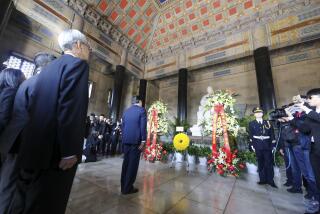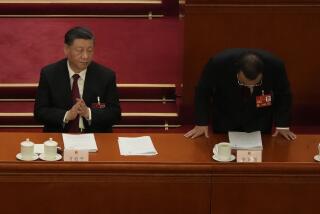Chinese president’s father is getting a postmortem revival
- Share via
FUPING, China — A statue of the father of the nation’s leader — 60 tons of granite — serves as the centerpiece of a square flanked by cypress trees.
People approach along a long walkway and bow in the direction of his seated figure. Many carry oversized sprays of flowers. A museum dedicated to his life is at the other end of the walkway. Older women with straw hats and baskets squat on the grass, picking out weeds by hand to keep the grounds immaculate.
The optics look straight out of North Korea, but this is in fact China. The statue and park in the city of Fuping are devoted to Xi Zhongxun, the late father of Xi Jinping, who became China’s president in March and also serves as general secretary of the Communist Party.
The late Xi, an early communist leader, is enjoying a postmortem revival.
In honor of the 100th anniversary of his birth, the Chinese post office issued two commemorative stamps Tuesday, one a portrait and the other showing him in his Red Army uniform. Commemorative ceremonies were held around the country, including one in Beijing’s Great Hall of the People, presided over by his son.
Many of the tributes are centered in Fuping, the city of his birth and burial in Shaanxi province. The statue here was constructed in 2005, at a time his son was serving as party secretary in Zhejiang province.
The local government is now raising money for what it says will be a $3-billion theme park spread over 2,700 acres. The park is to include entertainment, cultural and exhibition centers and a spa, according to a notice published in April by the municipal government.
“The new park will have a larger statue of Xi Zhongxun,” said Yan Xiaoqiang, a tourism official in Fuping.
Fuping’s interest in Xi Zhongxun was inspired by the boom in what is called “red tourism,” he said.
“Chinese are paying more attention to their own history and commemorating the revolutionary heroes who helped to establish the country,” said Yan. “It is about Xi Zhongxun’s contributions to Chinese history, not about his son being president.”
Nevertheless, the coincidence cannot be so easily dismissed, political experts say.
“When the son is promoted so is the father,” said Li Datong, a former editor at the Communist Youth Daily newspaper whose family was acquainted with Xi’s.
In no way is the celebration of the elder Xi made out of whole cloth, like in North Korea, where battle victories and other exploits (such as the claim that late leader Kim Jong Il scored 11 holes in one during his first golf game) have been totally concocted.
Xi Zhongxun was genuinely revered as an aide to Mao Tse-tung in setting up the Communist Party’s base in Shaanxi province during the 1940s. Purged in the 1960s during the party rift that preceded the Cultural Revolution, he was later rehabilitated and became instrumental in opening the southern province of Guangdong to a market economy.
In his later years, however, he fell out again with the party leadership, having supported liberal Communist Party leader Hu Yaobang. He is widely believed to have disapproved of the crackdown on student demonstrators in Tiananmen Square in 1989.
“After 1989, Xi Zhongxun was cast aside. Until the time of his death, he rarely appeared at public events,” said Li.
As a result, much about Xi Zhongxun remains sensitive for the Communist Party. The second volume of his official biography was completed in 2009 but held up by censors until August.
In the museum next to the statue is a photo exhibit titled “A Noble Spirit Will Never Perish” that jumps from the 1950s to 1978, conveniently omitting Xi’s persecution by Mao during the Cultural Revolution.
After his death in 2002, his ashes were buried at Babaoshan, the official cemetery of the Communist Party, but moved to Fuping in 2005, the year the statue was erected.
Under Chinese traditions of feng shui, tombs of the ancestors are believed to greatly influence the fortunes of the living and saboteurs have been known to vandalize graves in an attempt to vanquish their political enemies.
The grave of the leader’s father has brought increasing numbers of tourists to Fuping, a backwater even by the standards of rural Shaanxi province. A parade of delegations, some organized by the Communist Youth League, visited the site during the weeklong holiday beginning Oct. 1.
“There has definitely been an increase in visits since Xi Zhongxun’s son became leader,” said Yan, the Fuping tourism official. “During the national holidays, it is so crowded there isn’t even a place to stand.”
One person who hasn’t visited much is Xi Jinping. Aside from the ceremony Tuesday, the president has distanced himself from the tributes. Political analysts say Xi is keen to avoid the perception that he is a “princeling,” a derogatory expression for the privileged second-generation communists who are among China’s elite.
“Whenever Xi goes to visit the family tomb, he is very low-key. He does not want to be accused of creating a cult of personality,” said Zhang Lifan, a Beijing historian.
At a major symposium last week in Gansu province, the president’s younger brother, Xi Yuanping, and other speakers didn’t mention the salient fact that a son of Xi Zhongxun is the president.
The ceremony took place in Gansu’s Liangdang county, where Xi Zhongxun lived in the mid-1930s. The local government has spent $33 million restoring the house where the older Xi lived and building a memorial site, according to a state media report in June.
Li, the retired editor, believes that Xi Jinping is not personally responsible for the initiatives.
“It is a huge taboo for Chinese leaders to expand family tombs or renovate childhood homes,” said Li. “I think this is all local officials trying to ingratiate themselves. That’s how China works.”
Tommy Yang of The Times’ Beijing bureau contributed to this report.
More to Read
Sign up for Essential California
The most important California stories and recommendations in your inbox every morning.
You may occasionally receive promotional content from the Los Angeles Times.










